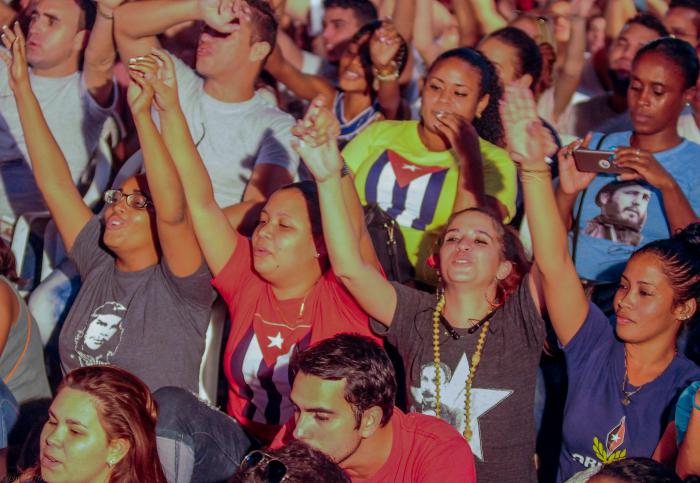Sine La Bayamesa, by Céspedes, Castillo and Fornaris, written in 1851, to They Call me Cuba (Me dicen Cuba), in which Alexander Abreu inserted, in the midst of the frenetic sound, the notes of the Bayamo Hymn, the Homeland has been sung one, ten, thousand times, in its cleanest and most endearing essences. Because a people with music in their soul expresses their sense of belonging in the art that best represents them.
Against this tradition, permanently updated, any attempt to pervert feelings and erode convictions will crash through operations like the one that, from Miami, where else!, began to circulate a few hours ago.
There are no hidden intentions. The text bets without dissimulation by the capitalist restoration and the overthrow of the revolutionary power. When reviewing the launch, served by communication channels at the service of subversion, the EFE agency highlighted those objectives: “The song is openly contrary to the Government of Cuba and its policies.”
There are no arguments on this issue, but a string of common places to the anti-Cuban discourse: ?a dictatorial Cuba where lies, repression, torture predominate; a dictatorship without popular support, you are already overflowing, you have nothing left, you are already going down, the people are tired of holding on?.
There is not even the slightest hint of ingenuity, not a shred of intelligence in the crude conversion of the motto Patria o Muerte, into Patria y Vida, the title of the diatribe. As if the defense of life, freedom, resistance, were not embodied in the slogan that accompanies us from the farewell to the victims of the sabotage of the ship La Coubre.
The alliance of the protagonists is not surprising either. Famous, the occasional talented person trained in our teaching system ?although it is known that fame and talent are not synonymous?, boosted by the trends of fashion within that strip that has been called urban music, they had commercial successes in Cuba.
Until, dazzled by the desire for greater profits, seduced by the Floridian celebrity linked to the anti-Cuban industry and with bad accounts about the resistance capacity of their own against the brutal onslaught of Trumpism against our people, they tore their clothes and they evidenced the precariousness of their ethical principles, if they had.
So, comfortably settled in Miami, they began to rant, revile, rant and rewrite their personal stories. One of them erased from his memory the verses he sang in 2016: (“I return to the cradle that saw me born / I return to that neighborhood that saw me run / what I was, what I am and will be for my beautiful island”); another, as if to leave no doubt about his moral character, denied having greeted the President of the Republic of Cuba at a concert (“it was a mistake … I was afraid”), and a third, certainly encouraged by a hallucinogenic high, threatened with coming to “give a machete” against the rulers.
In the latter, he is related to a guest to participate in the show: the criminal who in Havana asked Trump for “fire, fire and fire so that this is over”: blockade and invasion against Cuba. The fire that burns a Cuban flag in the video. The fire of vileness with which they try to muddy the memory of Martí and Che in the lyrics. The fire against the Homeland, against life.
It will be good to keep in the heart the words written by Martí to a compatriot in 1886: ?The Homeland needs sacrifices. It is altar and not a pedestal. It is served, but it must not be taken to serve of it?. And have them accompanied by a soundtrack that includes, among other themes, the Little Daytime Serenade, by Silvio Rodríguez.

